- Home
- Richard Matheson
Created By Page 5
Created By Read online
Page 5
Give me a break, Dad, thought Alan. We’re in the fuckin’ nineties here, this isn’t Brigadoon; get used to it.
“Alan!”
“Dad! Listen, don’t let me interrupt. Looks like you got a live one here.” He was talking loud enough for Grace Kelly’s hair to hear and she smiled tautly.
Burt raised a smile that kept a polite distance. It had always been that way, thought Alan, and it seemed things never changed. Never got easier.
Never got more personal.
Alan realized it had been the challenge of his childhood to seek his effect on his father by trying to surpass himself. Jokes. Gifts. Accomplishments. Money. Anything that could be measured. Admired. Objectified. All to get enthusiasm from a man he sensed deep down wasn’t capable of it. But Alan knew he’d always keep trying anyway.
It wasn’t that his father withheld love. Or had none. It was trickier. The love was all there. Just that Burt wasn’t. He was lost, preoccupied, pointing his telescope away from earth, at topics and issues, not human intimacy.
Since he’d retired from Broadway, and come to the Springs, it seemed to Alan it had gotten worse. Burt railed about lofty ideals but never spoke about personal stuff. It was always “the integrity of art” kind of shit. Life in the pauperized culture. Alan’s mother, Dee, had managed to keep Burt at sixes and sevens with it all. But since she was gone and Burt had remarried to Wanda, he’d become a bad Breslin column; half soapbox, half water balloon.
Wanda, not exactly Ariel Durant, wasn’t able to give Burt much perspective since she had the depth of a serving platter. Alan had never felt she was good enough for his father, but Burt had few complaints. She was his twenty-eight-year-old doll and made him happy no matter how much of a snipped kite she was. The word dip came to mind when contemplating Wanda. So did the word user. But Alan could never allow himself to say that to his father. It would’ve stabbed what little communication they’d managed over the years. It just wasn’t worth unscrewing the bulb over a woman who couldn’t understand peanut butter.
And it didn’t help that Alan was hormonally thrilled by the sight of her. When the sun hit her just right, like a crew of overhead lighting techs, he could see himself in bed with her. Lost in tight little muscle caves. Sometimes he thought it would be so easy to just—
Burt grabbed Alan’s shoulders.
“Hey, you made great time. Played Pac-Man with your radar gun, huh?”
The two laughed. But it was that strained sound that doesn’t make you think either person is that happy about things. Burt’s grape-green eyes blinked, waiting for Alan to fill in the blank. Alan was feeling it again; the way his dad always put him in that position. Waiting for Alan to do something. Expecting him to say something. Perform for him. Please the director. It was these moments Alan could see himself loading the chamber and pressing the barrel against Burt’s—
“… happy birthday, Dad.” Alan walked closer, gave his father a big hug. Burt smiled, hugged back.
See, it was things like that that drove Alan into the wall. Burt would hug like some big, loving, Italian father, then let go and stare. Not say a word. “Zorba goes zombie,” Dee used to say.
“Hungry?” Alan asked, even though what he really wanted to say was, “Dad, I’m uncomfortable in your company, but I love you and I wish maybe together we could work on it and make it better. What do you say?”
But he couldn’t. He’d opted for the safe topic. The habit. Anyway, he was only down for the day. How do you fix thirty-four years of being politely estranged from someone who gave you life and can barely see you, in an afternoon?
“Starved. I was thinking you’d be getting here around now, so I skipped breakfast. Wanda went shopping … picking me up something at the last second, no doubt.”
They walked toward the front door.
“How is Wanda, Dad?”
“Looks younger every day. I think her next birthday she’ll be what …?”
“Twelve?”
“Hey! I got a crazy idea for lunch. Little different than we planned. Okay with you?”
Alan shrugged. Smiled. It was nice to be with his dad.
The tram car tipped from the platform and groaned free, suspended by arm-thick cables. It had been made by the same firm that rigged the ones in Switzerland, which crept up snow-frosted mountains, snail-shuttling wool caps; red noses.
Burt was moving from side to side, staring out the window, acting like Mr. Gyroscope.
Alan felt sick.
“Ever been up this thing? You’ll love it. It’s a kick. Goes from the desert floor, thousands of feet up. Snow up there, too. Believe it? We’re going to eat in the snow. Crazy place to live.”
Alan acknowledged the wonder of it all by closing his eyes, trying to plug a cold sweat. Don’t pass out, you fucker, he told himself. It’s your Dad’s fucking birthday. Don’t be an asshole. Stay calm.
“Hey.” Burt was pointing. “Over there. Mountain goat.”
He ran a tanned hand over the railing under the window. “I mention your sister sent me a card? Cute message. The marriage must be wobbling, though. Loren didn’t sign it. Just her and the kids.” Burt gestured philosophically.
Alan always dug Loren. But when he and Marie had this garlic/vampire effect on each other, it was hard to like either one. Good was quickly pleated into anger and destruction when they got around each other. But the kids were gorgeous. They made beautiful children together.
“Yeah, I don’t talk to them too much. Owe them a call I think.” Had to be four months. Alan and Marie had little in common. He’d tried. She’d tried. They just couldn’t get the horizontal and vertical right.
Father and son nodded in a way that moated off further discussion. Alan’s sister wasn’t an area for pleasant conversation. Burt and Marie were as different as there and gone and the future dimmed when you considered the stuff that comprised their basic cores. Forget it, thought Alan. That relationship just washed up on shore one day and headed off onto the island of life in two separate directions.
“Just too independent for her own good. Never did get with her outlook.” Burt looked over the retreating Springs. “But one hell of a cute card. Real sweet. Hey, you still living in that house at the beach? That murder place? Why don’t you move?”
“It was a great deal. Told you. And it’s an incredible spot.”
“I couldn’t live there.”
“You don’t have to.”
“Violent death clings to things.”
“Nice phrase. Junior college?”
A competing smile.
“Anyway, I never think about what happened.” It was a lie.
“I think it’s very weird you don’t think it’s weird. I couldn’t live there. Upset me too much.”
“What’re you talking about? Palm Springs is fucking death row. Everybody listening to their Grecian Formula dry. Waiting to kick.”
“Oh, that’s a nice thought …”
Alan felt his colon trapeze as the tram car hitched over one of the towers that guided it up the mountain. He gripped the handrail. Burt noticed.
“Afraid of heights? Shoulda told me.”
Alan managed a smile. “Falling. Afraid of falling. Different.”
Burt laughed, silver, Sinatra hair shimmering. He steadied Alan, wanted to talk about a film Warner’s was thinking about offering him to direct. He told Alan it would be a joint production between a French financier and Warner’s and would star Julie Naughton.
“She’s still alive?” Alan remembered Julie from when he was a kid and his dad almost killed her with his bare hands.
Julie had been an impossibly gifted, anorexic nightingale, and basic renaissance loon, with so much scar tissue on her wrists, her hands seemed attached by skin-zippers. She was egotistical and demanding; a Bell Jar Mary Martin.
Eight years back, when Alan was still at 20th, executive story editing a G.Q. cop show, and his dad was between musicals, Burt had directed Julie and Dru Simone, an annoyingly moody
ex-model and recovered heroin addict, in a two-woman Grand Guignol three-act for a Central Park summer festival. The play was about two sarcastic lesbians who shared clitoral intimacy up to the moment one, armed with scissors she’d been using to snip tampon coupons, reduced the other to entrails, then committed suicide, gulping a Smith and Wesson.
The play, titled East Infection, had been written by a bitter but witty androgyne who later put his/her head in an oven and died as a slightly confused roast. Opening night, it had sickened theater critic Frank Rich, who closed the show.
Burt had been cited in all major criticisms, and Newsweek had referred to him as a former footlight wunderkind whose every good instinct had simply “dropped dead.”
One thankfully brief Esquire blurb had said the play was a “drill with no bit which still managed to bore. No one was sorry when the lesbian murder-suicide was over and the single regret was the play hadn’t opened with it.”
Still, Burt and Julie had mostly gotten along and always sworn they’d find a project, up the line, to do together. Mademoiselle Simone had retired from performing altogether, after two badly received, excessively cheery films she’d done in Australia lost huge money. She eventually opened a chain of croissant-themed sandwich places which sprang up all over America like poppies.
“Howard the Dyke …” was all Alan said, teasing Burt with his usual joke about East Infection’s reviews.
Burt smiled tightly. “Got your mom’s sense of humor, telling you. If you’d taken after me, they’d’ve thrown you out of TV a long time ago. I’m too damn serious. Can’t do humor. Different mind-set. Lighter, I suppose.” He coughed. “Hey, I ever ask you if you know Norman Lear?”
A hundred times.
Alan spilled a little of his vodka and tonic onto Norman’s arm at the bar at a Writers Guild strike meeting once. Norman was decent about it.
“Yeah. Great guy.”
“Gotta hand it to him. Guy takes prejudice, turns it into an entertainment empire. It’s impressive.”
Alan waited for the fatherly advice that always followed the question about Norman Lear.
“You know, that’s what you oughta start thinking about with your writing.” It never failed. “I mean, long as you’re doing something other than selling deodorant from eight to eleven every night.” He tried to clarify but Alan was already upset. “I’m talking about the limits of television … not your talent. You understand what I mean.”
Alan said nothing. His father never realized what a fucking elitist he was and there would be no point in Alan telling him. He hated the way Burt always made him feel small and trivial for being in TV. Like he put toy whistles in Cracker Jack boxes for a living.
Mr. Broadway. Mr. Lime-fucking-light. Mr. I’m-fucking-better.
“Having fun?” Burt was smiling.
Alan said nothing, staring out at a goat.
There was snow.
A giant Georgia O’Keeffe desert way down there and up here, all this cold, white stuff. The tram car docked drunkenly at the top and doors slid open.
The restaurant perched, as if some avalanche lookout station in Grenoble, complete with blond behemoths walking around like Robert Shaw in From Russia with Love; Third Reich knights.
It was deserted. Chairs turned upside down on redwood plank tables, making the whole place a warehouse full of reverse gravity picnic sets.
Alan dipped chicken chunks in teriyaki sauce as he and Burt stared out over the desert, seated on the balcony. Tall pines swayed and wind dropped cones on the roof. Clonk.
“So … how’s your novel coming along?” Burt tried so hard to make decent conversation, to Alan it always sounded like it was learned from a bad article on improving human relations in some retiree’s magazine.
“Okay. I mean, it’s a first novel.” He laughed a little. Spread lost hands. “I basically have no damn idea what I’m doing. Not like writing scripts at all. It’s all about internal, not external.” He took a sip of espresso; a giant’s hand holding a doll cup. “Anyway, it’s tough making the time.”
Burt pointed with his fork, gobbling fettucine.
“Gotta make the time. Always more you can do.” He slid back slightly from the table, expanding his pulpit. “When I was doing Broadway, I always thought … you know, I’m maxed-out, time wise, energy wise. But you find a way when you care.”
“Television is a little different. The pace …”
Burt waved his hand in wordless agreement; a Helen Keller comment. Wiped his mouth of Alfredo. “I understand. Not comparing the two. You know, I’m not questioning what you do as a way of life … even an art form.”
Bullshit, thought Alan. He meant every fucking word.
“Look, Alan … you know how highly I think of what you can do with your writing. “He burped, softly. “Sometimes I just feel TV can’t capture what you have to offer as an artist. It’s inveterate to the medium. That’s my point.”
Alan could never be sure exactly what his point was. But it always made him uncomfortable and ill at ease. Like his father was knocking it all under there somewhere; under the pretty words.
“Maybe we should change the subject.”
Burt agreed. Then, couldn’t.
“Alan, you’re too good. I know you hate it when I remind you, but you are. You’ve got more talent in your little finger than a hundred Norman Lears or Bochcos or … who’s that damn heroin addict that did that Miami thing with Don Johnson …?”
“Michael Mann. ‘Miami Vice.’ He’s not a heroin addict. He wrote about drugs.”
“Good-looking show. Great production values. But what are the damn characters saying to each other? Too esoteric. That’s what I like about what you’re trying for with your stuff.” He played with the salt shaker, screwing, unscrewing. “You’re never afraid of your own voice. You know, you were always a fearful boy … afraid to confront, afraid of so many things. It’s good you don’t do that in your work.”
Burt tried to remember, face doing a quiet flashback. “Maybe your fear early on … I don’t know … maybe it’s because of Mom. Guilt, maybe? Possible, I suppose.”
Alan didn’t like the way his father’s thoughts were facing; didn’t want to be in another plane crash together.
“Dad, it’s your birthday remember? We didn’t climb fifty miles above the earth’s surface to discuss what I do for a living, or what happened to Mom. Maybe I should give you your present.”
“What is it?”
“A blue sweater.”
“Great idea!”
“Should be. You’ve been asking me for seven months.” He mocked Burt’s low voice. “I want a blue sweater. Hey, I’d love a blue sweater. Know what I don’t have? A—”
“Okay, okay.” When Burt laughed, he was handsome the way Newman was. He sipped some cappuccino and lit his pipe. A cloud of Chart Well lounged between them.
“So … how’s the new place in Malibu where the people were murdered in cold blood?”
Alan chuckled, patiently.
“Tell you what, I’d rather talk about my career and get lectured than answer questions about my house.”
Burt’s eyes twinkled; an opening blade on a pocket-knife.
“I got a question for you. You think television is real?”
“Real?”
“In your mind? Does it really exist? Or is it a lot of craft, however heartfelt?”
Alan was right. Dad was moving in for the kill.
“You mean, of course, like the stage has heart and soul? Something like that?”
Burt said nothing but it was clearly something like that. Alan went back to his julienne fries, holding their yellow heads under ketchup. Burt kept puffing, thinking.
“I don’t know too many writers … true writers … who wouldn’t agree the stage has more life. I mean, shit, Alan … it’s right up there, pumping away like crazy. Reaching out. Grabbing you by the ears and saying ‘hey, motherfucker, I’m here. I exist. And I will leave you a different person when you leave th
is theater.’ ”
Alan felt his stomach tightening.
“And television is what? Some … I don’t know … mindless contrivance that just sands corners till you can’t feel them?”
“Can you feel them? I can’t.”
“Dad, with all due respect, you’re full of it. Maybe it’s time for the blue sweater portion of the show?”
Burt wasn’t interested.
“How about we go for a walk, then?”
“Just let me finish the point.” Burt sat higher; passionate. “C’mon, let’s face it, in TV they sweeten the audience reaction with laugh tracks. They hose migraine music all over sequences that don’t work. Actors are picked by demographics. Demographics. You know what that means?”
Alan knew.
“It means,” explained Burt, “a goddamned computer picks ’em for you. ‘TV-Q.’ Now if that’s soul …” He was tamping the pipe, slowly shaking his head.
Alan realized he was going to have to fight back if this meal wasn’t going to turn into the lunch from hell. “And you didn’t think about audience reaction when you directed a Plummer or a Preston? Elizabeth Ashley? Pacino? Gimme a break. What you’re saying is supercilious and condescending.”
“Do you have to use such big words?” Burt was smiling.
Alan hated it when his father teased him but continued. “Listen, Dad … I remember. I was there. I heard you bitching at the dinner table back in the Gramercy Park apartment when I was a kid. You used to suffer over the casting. If you didn’t get a major name, you practically had to be peeled off the roof, and things for Mom and Marie and me were lousy till you cheered up and got somebody you could splash on the marquee.” Alan was breathing hard. “Your memory is playing games with you.”
“Casting stage isn’t the same thing.”
Alan placed his water glass down, irritably. “Exactly the same thing! You think because it’s put on film it’s not real? It has no substance? What’re you talking about?”
“Ah, ah, ah,… hold it. Film isn’t the issue. Lotta fine films have come down the pike. But they were the expression of a single artistic vision …”

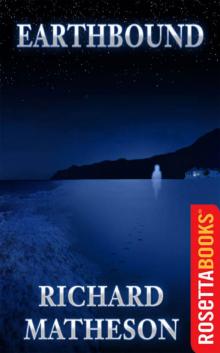 Earthbound
Earthbound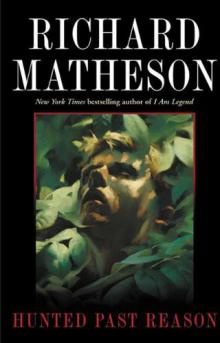 Hunted Past Reason
Hunted Past Reason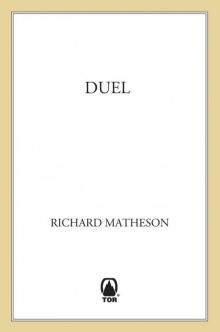 Duel: Terror Stories
Duel: Terror Stories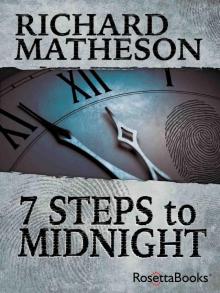 7 Steps to Midnight
7 Steps to Midnight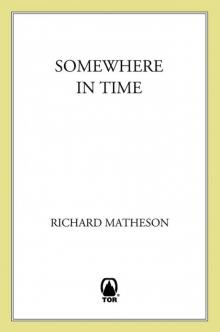 Somewhere in Time
Somewhere in Time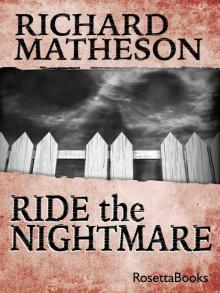 Ride the Nightmare
Ride the Nightmare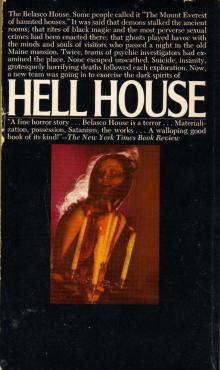 Hell House
Hell House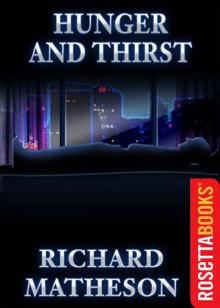 Hunger and Thirst
Hunger and Thirst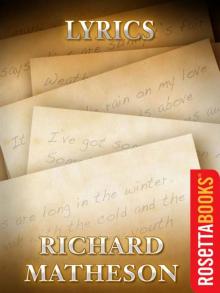 Lyrics
Lyrics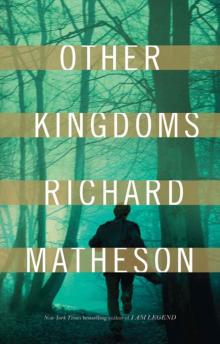 Other Kingdoms
Other Kingdoms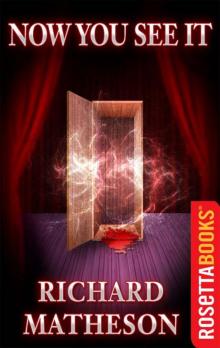 Now You See It . . .
Now You See It . . .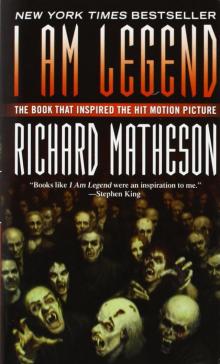 I Am Legend
I Am Legend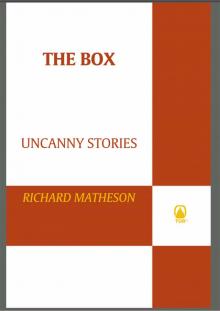 The Box: Uncanny Stories
The Box: Uncanny Stories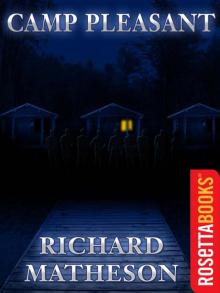 Camp Pleasant
Camp Pleasant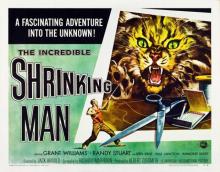 The Incredible Shrinking Man
The Incredible Shrinking Man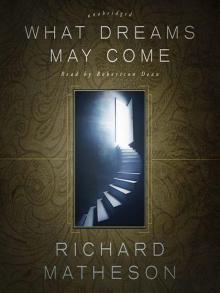 What Dreams May Come
What Dreams May Come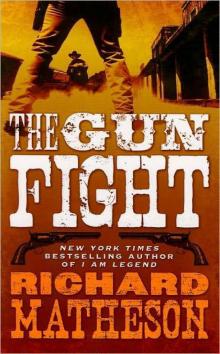 The Gun Fight
The Gun Fight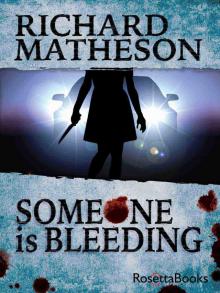 Someone Is Bleeding
Someone Is Bleeding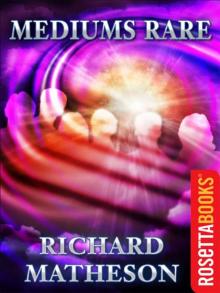 Mediums Rare
Mediums Rare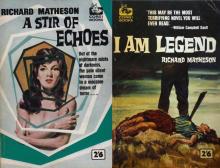 A Stir of Echoes
A Stir of Echoes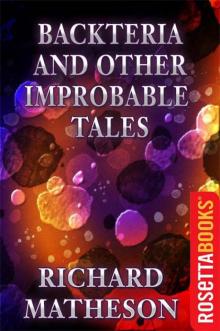 Backteria and Other Improbable Tales
Backteria and Other Improbable Tales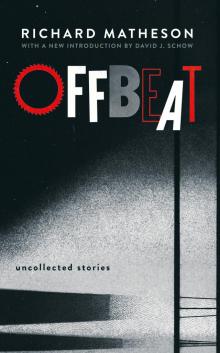 Offbeat: Uncollected Stories
Offbeat: Uncollected Stories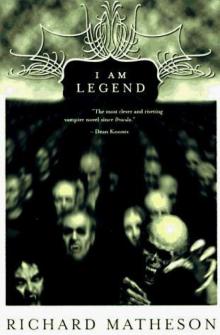 I Am Legend and Other Stories
I Am Legend and Other Stories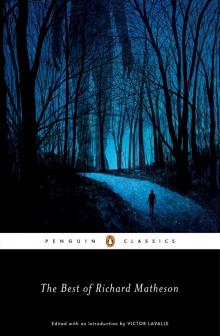 The Best of Richard Matheson
The Best of Richard Matheson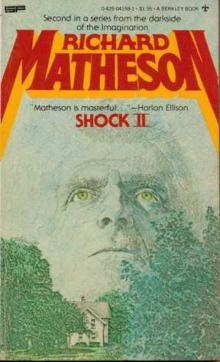 Shock II
Shock II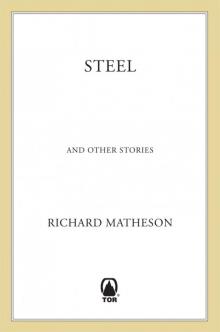 Steel: And Other Stories
Steel: And Other Stories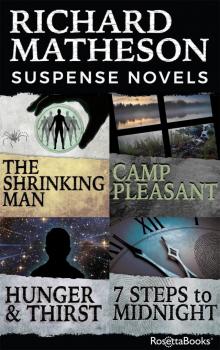 Richard Matheson Suspense Novels
Richard Matheson Suspense Novels The Link
The Link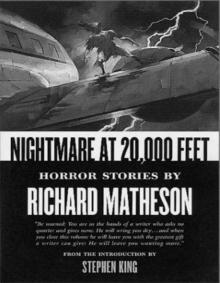 Nightmare At 20,000 Feet
Nightmare At 20,000 Feet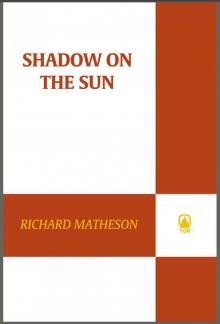 Shadow on the Sun
Shadow on the Sun![Steel and other stories [SSC] Read online](http://i1.bookreadfree.com/i/03/21/steel_and_other_stories_ssc_preview.jpg) Steel and other stories [SSC]
Steel and other stories [SSC] Created By
Created By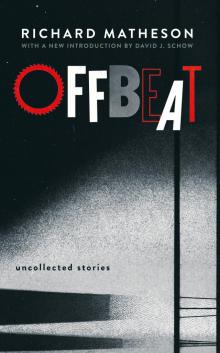 Offbeat
Offbeat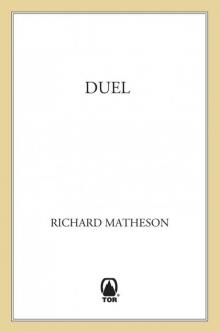 Duel
Duel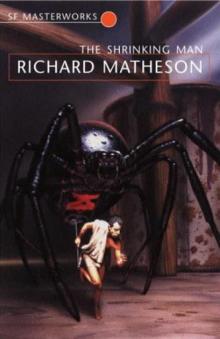 The Shrinking Man
The Shrinking Man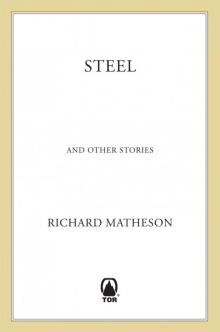 Steel
Steel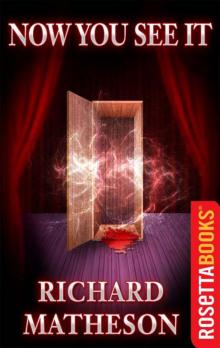 Now You See It
Now You See It